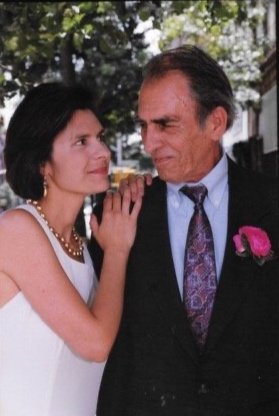Sailing Home
Jenny Apostol
Author and father at her wedding
Word Count 844
He ruin'd me, and I am re-begot /Of absence, darkness, death: things which are not.
--John Donne, “A Nocturnal upon St. Lucy’s Day”
The day after my wedding, my father and I sat in the backyard of my Brooklyn apartment, drinking beer and talking for hours, relaxed in a way I hadn’t often felt with him. It was July. He chain-smoked on a lawn chair while I sweltered on the wrought iron staircase that led to the terrace above. He sounded happy about the family I had found, a life created so differently from his. Then he told me he never should have had children.
I didn’t know my father well. When I was barely two years old, he fled New York City for small-town Ohio, and I didn’t see him often. I felt shy around him, our conversation stilted. He tried to tell me about himself, but mostly, my father spoke of people he admired: writers, musicians, filmmakers, the guys he played chess with. It all sounded fairly meaningless to me. Over the years, Dad kindly acceded how well I’d been raised to my mother. As if unsure about what he deserved to take credit for, he ascribed my virtues to her, the schools, and community where we lived—values shared but not ones he seemed to afford. His retreat angered my mother, and her sadness, never far below the surface, grew bigger than mine. I told myself that my father’s absence made life easier for both of us. His faltering, lisp-y speech plus a hesitancy to overreach (as if taking responsibility were to take something away) was both a gift and a curse. I was free to become myself and also set adrift, reflecting his own detachment. I was intent on not missing him.
Dad came to my wedding, though. Only a few of my friends, not even my husband, had ever met him. I was past age 30, and even though they hadn’t fought in years, I still worried whether my parents would get along during the ceremony. I remember a fleeting moment of sadness seeing them sit together amiably, aware suddenly of what I’d lost. When the pastor took his place, my father rose from his seat and offered me his arm with a smile, ready to walk me down the aisle. “Not that kind of wedding, Dad,” I snapped. He’d never shown me how to need him. I wasn’t his to give away.
My father dreamed of sailing home to Greece. To navigate by stars through a hand-built telescope on a boat he’d framed in steel. Each wooden slat perfectly aligned. Sea-worthy, solid from the dry dock of his overgrown backyard. His yearbook from the Cincinnati Conservatory, class of ’52: Junior (not pictured). Composition major (nocturne, symphony, concerto: dropped). For a time, my father felt angry about his inability to break through as an artist. Then, he let go. Jobs as welder, carpenter, bus driver left him free to roam his mind. Super-8 movies projected in 35 mm ratio through a jerry-rigged cinemascope, scored in his head. Drawings and photographs. A Leonardo-type skimming the nearest Ohio lake in a yard-sale sunfish, curious about how things work, ironic about what never would.
How to repair the tear between one’s dreams and life as it comes?
The day before the wedding, as we walked down a leafy street near where I’d grown up, my father touched my arm to slow me down. He was straining from shortness of breath. Advanced stage emphysema, he said. He’d been smoking since his teens, yet acted as bewildered by the admission as the diagnosis: “Well I can’t quit now!” he declared, as if it were the most obvious thing in the world. As if I’d asked him to.
I don’t think my father wished I’d never been born when he said what he said. There’d been a son stillborn, and I had a half-sister who was in jail. Nor do I think he was retaliating for how I’d denied him the chance to claim his fatherly place, to make-up for all the times he hadn’t. I’d not read his favorite poetry (Rosetti) or novels (Melville, Conrad), didn’t listen to the music he liked (Mahler) or know his friends. Dad already knew what I’d yet to learn: how to accept people for who they are not.
Five months later, my father died, so we never got the chance to discuss the painful things we’d said to one another so casually, never intending harm. Soon the marriage died too, but the photographer staged some beautiful portraits. Me standing alongside my father in wedding make-up and a glamorous white dress, face composed but inert. He looks relaxed in an old guy handsome way, eyes a little watery or slightly lost. That fall, I sent him copies of the prints, and we exchanged letters. In one of them, my father paid his highest compliment: it had been “the Moby Dick of weddings,” he wrote, like a seafarer thrilling to what he admires most, yearning before it disappears.
Jenny’s essays have appeared or are forthcoming in Kenyon Review, The Washington Post, Brevity, Speculative Nonfiction, Cordella, SweetLit, Blood Tree Literature, and Creative Nonfiction's "Sunday Short Reads" among other publications. She lives outside of Washington DC with her husband, a dog, a cat, five hens, and occasionally, two adult children. You can find Jenny’s work at jennyapostol.com.
